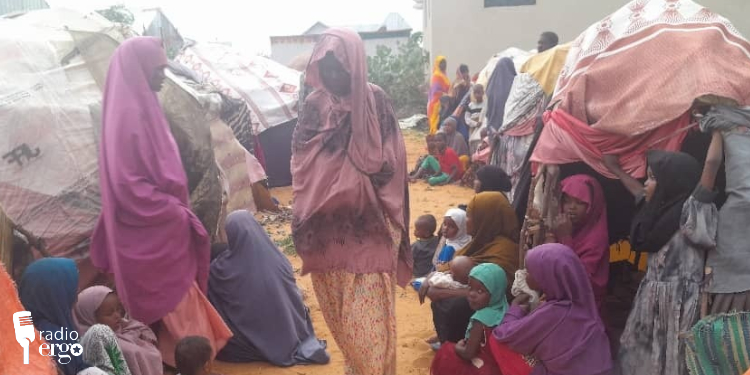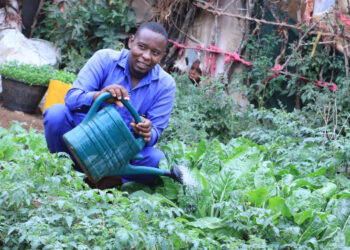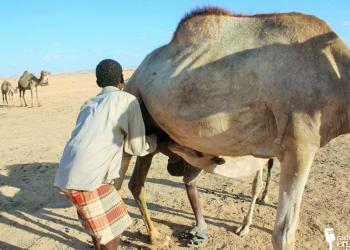(ERGO) – Hundreds of families who fled their homes in Lower Shabelle region of southern Somalia because of fighting between government forces and Al Shabaab are facing hunger, water shortages, and lack of proper shelter in internal displacement camps in Mogadishu.
Among them, Muno Sheikh Abdisalan – seven months pregnant – told Radio Ergo that she was begging in the neighbourhoods of Mogadishu to try to feed her five children and herself.
“If we get food once a day, we thank God. But sometimes even that one time is not possible. There are nights and days when my children eat nothing, and I put them to sleep with water. Our situation is very bad. We have no hope except from God,” she said.
“We live in a hut made from worn-out pieces of cloth that neighbours gave us, and poles we collected from Ali-garoba trees. The nights are very cold, and my children sleep on the bare ground with no mattresses, their skin is covered in sores.”
Back home in Mubarak district in Lower Shabelle, her family had a three-room home, which is now occupied by government forces. They also own three hectares of farmland and 37 goats and cows that provided them with a living.
However, they had to abandon their crops of maize and beans that were due for harvest in April when the conflict erupted, causing them to lose the $300 they had invested in seeds.
Her husband, who is unemployed, returned from the IDP camp in Mogadishu to Mubarak in August to check if any of their livestock had survived. Sadly, he found that they had all died due to neglect, lack of pasture, and water shortages.
Water is another constant worry for Muno in the IDP camp. A jerrycan of water sold by private vendors costs $1, which they cannot afford. She said the camp leader had been helping them get water occasionally.
Muno said they walked over 50 km from Mubarak to Hilaac IDP camp in the capital city, spending two days and nights on the way without food or water. They had hoped to find some relief in the camps.
The sudden flare-up of fighting has forced many families who once lived well off their farms and livestock to seek refuge in dismal camps in Mogadishu. The areas they arrive in usually lack basic services, plunging them into hardship with no solutions.
Hindiya Abdi Ibrahim, another displaced mother, struggles to raise her five children alone. To get at least one meal a day, she searches regularly for cleaning jobs. In a week, she manages to find work once or twice for about $3.
“When I can’t find work, I borrow from shops near the camp to buy water. Life in your own home is not the same as this. Our life before was good, but fighting forced us to flee our homes and farms. Here, people have helped us by giving us food and water on credit, but our needs remain,” Hindiya said.
She has accumulated $50 in debt since April, which has been guaranteed by the camp chairman. She was warned she will not receive more credit if she cannot repay this amount. Two of her children, who used to attend Koranic school in Marerey for $6 a month, have also been forced out of education.
Hindiya’s family left behind a 2.5-hectare farm in Mararey, where they had planted maize, pumpkin, cucumber, carrots, and lemons. They missed the July harvest after they fled and therefore lost $400 worth of seeds they had bought on credit.
“A local elder lent me the money for seeds, and we agreed I would repay him after the harvest. But fighting started just after planting. The stress of that debt is unbearable, I can’t sleep day or night. I only pray to God not to let me die without paying it back,” she said.
Like many others, Hindiya cannot return home while fighting continues.
Mohamed Abdi Abdullahi, 45, is also among the families fleeing from conflict in Lower Shabelle. He arrived in Mogadishu with his wife and 13 children. As a lifelong farmer, he has no other skills and jobs in the city are scarce anyway.
“I can’t find work. I am new in Mogadishu and know nobody. If you don’t have someone to introduce you, they say they don’t know you and send you away. My wife has also been sick since May, but I cannot afford to take her to a hospital,” he said.
His family last planted three-hectare farm in Awdhigle in 2024, as poor rainfall in 2025 prevented them from planting more recently. Their stored maize from last year had run out.
The conflict drove them out in April, when their iron-sheet house, with a toilet, water well, and kitchen, were burnt down.
“I have no hope of returning. Everything where we came from was burnt – our house, beds, mattresses, everything. My only hope is that my children can get education, care, and a better life here,” Mohamed said.
The conflict between government forces and Al Shabaab in Lower Shabelle has created waves of fresh displacement, uprooting those who had a source of livelihood to IDP camps lacking basic services and opportunities for alternative income.
With a combination of continued drought and conflict predicted by UN agencies to force many more into displacement during the last part of this year, the camps in Mogadishu look set to see many more new arrivals facing similar pitiful challenges.










